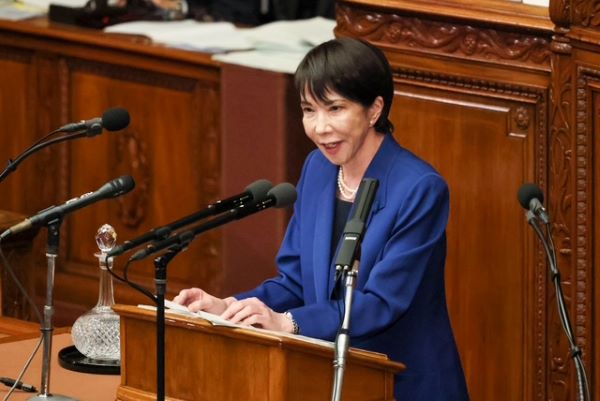Sanae Takaichi – Japan’s First Woman Prime Minister – By George Braine


Sixty-five years after Sri Lanka elected its first woman prime minister, Japan finally has its first, Sanae Takaichi. The last time a woman led Japan was in 1771, when the imperial throne was occupied by Empress Go Sakuramachi.
Other than being the first woman prime ministers of their respective countries, Ms. Takaichi and Sirima Bandaranaike have nothing in common. Mrs. Bandaranaike, who was from an aristocratic lineage, entered politics when her husband, the Prime Minister of Sri Lanka, was assassinated and she was nominated to lead his political party. She campaigned on the sympathy vote, addressing political meetings dressed in white, weeping profusely, earning the nickname “weeping widow”. Sanae Takaichi, from a working-class family, had to rise through the ranks to reach the top.
Slim and diminutive with an easy smile, Ms. Takaichi represents the Liberal Democratic Party (LDP) which she also leads, the first woman to hold that position. A member of the House of Representatives since 1993 (with a 2-year break), she has held several ministerial positions and is a protégé of the former prime minister Shinzo Abe. A self-made politician (she does not come from a political dynasty), she is well known for her right-wing views.
Ms. Takaichi was born in 1961 in Nara Prefecture in central Japan, to an office worker father and a mother who was a police officer. Despite qualifying to enter two prestigious private universities in Tokyo, she commuted six hours a day to attend Kobe University. The reason: her parents refused to pay tuition fees if she left home or chose a private university because she was a woman. Even at Kobe University, she paid her way through part-time work.

After graduation, Ms. Takaichi enrolled in a program that trains young people in politics. In 1987, she left for the United States to work as a congressional aide to the Democratic congresswoman Pat Schroder of Colorado. In 1989, she became a co-host of TV Asahi and later joined Fuji Television as a presenter. In 1993, Ms. Takaichi was elected to the House of Representatives, Japan’s lower house, as an independent. In the 2014 general election, as a member of the LDP, she defeated the runner-up by 58,000 votes.
Ms. Takaichi married a fellow member of the House, Taku Yamamoto, in 2004, and, not having children of her own, adopted his three children from a previous marriage. They divorced in 2017 because they were “arguing endlessly about politics”. Nevertheless, they remarried four years later. Later, when Yamamoto became partially paralyzed, Ms. Takaichi became his caregiver.
Ms. Takaichi is a fan of horse racing, heavy metal music (she played drums and the piano in a band while at university and still plays drums as a stress reliever), and manga. She is also a motorcyclist and a scuba diver. She is known to be a smoker.
A great admirer of Britain’s former prime minister Margaret Thatcher, Ms. Takaichi is a sometimes regarded as ultraconservative. She opposes same sex marriage, separate surnames for spouses, and female succession to the Japanese throne. She supports the revision of an article in the Japanese Constitution that forbids the use of military force, a pro-Taiwanese foreign policy, and strengthening of the US-Japan alliance. More controversially, she is said to hold revisionist views of Japan’s often brutal conduct during World War II, and has made regular visits to the Yasukuni Shrine, where some Japanese war criminals are enshrined. Such visits by Japanese politicians anger China and South Korea, countries which suffered greatly at the hands of Japan during World War II.
Ms. Takaichi became prime minister on October 21 of this year. Because the LDP suffered two consecutive defeats in national elections, it’s a minority in both the Lower and Upper Houses of Parliament. This necessitated much horse trading with smaller parties before Ms. Takaichi could form a government. Although the LDP’s approval rating is at 27%, her Cabinet has a surprisingly high approval rating of 82%.
The new PM inherits several issues that are of immediate concern to Japan. Locally, the decline in birth rates and an ageing population and their effects on the economy are perhaps paramount. Next, the recent doubling of the price of rice has led to a sharp rise in the cost of living. Japan is a patriarchal society and sexism is every present. The country has a massive national debt and relies on energy imports. Donald Trump’s tariffs could become a huge hit on the economy if not resolved soon. A large influx of foreigners, as workers and tourists, also causes concern in Japan’s homogeneous society. Rising xenophobia is evident. Especially in Okinawa, the presence of the American military has long angered the local populace.
Internationally, a perennial issue is the abduction of Japanese citizens by North Korea, and the inability of the government to resolve the problem. Japan’s wartime atrocities, the so called “comfort women” issue that angers South Korea, and the Nanjing massacre and other cruelties in China, are ongoing conflicts that may never be resolved. In fact, Japan is surrounded by nations – China, South Korea, and Russia – that harbor long standing resentments against Japan.
Only weeks into her premiership, Ms. Takaichi has run into two problems, one international and the other domestic, that are of her own making. First, on November 7, when asked in parliament about what Japan’s response would be if China attacked Taiwan, Ms. Takaichi stated that such a use of military force against Taiwan (which lies only 70 miles from Japanese territory) would be considered a “survival-threatening situation” for Japan, forcing Japan to consider deploying her military forces. In other words, an attack on Taiwan will be regarded as an attack on Japanese maritime, economic and security interests.
China considers Taiwan a province and reacts with fury to any suggestion of Taiwan’s independence, especially from Japan, which ruled Taiwan from 1895 to 1945 and left behind a well-educated populace that felt closer to Japan than China. As usual, the Chinese reactions were swift: the consul general of China in Osaka, a Japanese city, posted the following statement on social media: “That filthy head that has come charging forward on its own accord will have to be cut off without a moment’s hesitation. Are you prepared for that?” (Quoted in The New York Times). Ms. Takaichi was labeled “an evil witch” by a prominent Chinese nationalist. China Central Television, the state broadcaster, commented that Japanese leaders who interfere in Taiwan are “doomed to dig their own graves”.
Not stopping with such talk, China warned travelers and students to avoid Japan, leading nearly 500,000 Chinese tourists to cancel their flights. Around 6.7 million Chinese tourist visited Japan in the first eight months of this year, and the travel cancellations could cause economic damage amounting to US$14 billion to Japan. A few days ago, China canceled seafood imports from Japan, another hit on the economy.
While the China issue was raging, Ms. Takaichi created a domestic backlash by convening a meeting at 3 o’clock in the morning. Although she has previously rejected the idea of work-life balance, saying she would “work and work and work and work”, a meeting that early in the morning, involving several aides and which lasted three hours, drew sharp criticism because of “karoshi” (death from overwork), a highly sensitive issue in Japan. A former prime minister called her action “crazy.”
Ms. Takaichi’s political hero Margaret Thatcher, Britain’s first woman prime minister, served for 11 years and 209 days, winning three consecutive elections. But, this morning, I saw a headline which stated that Ms. Yakaichi’s row with China, a “GDP killer,” could sink her.
That would be a pity.



















